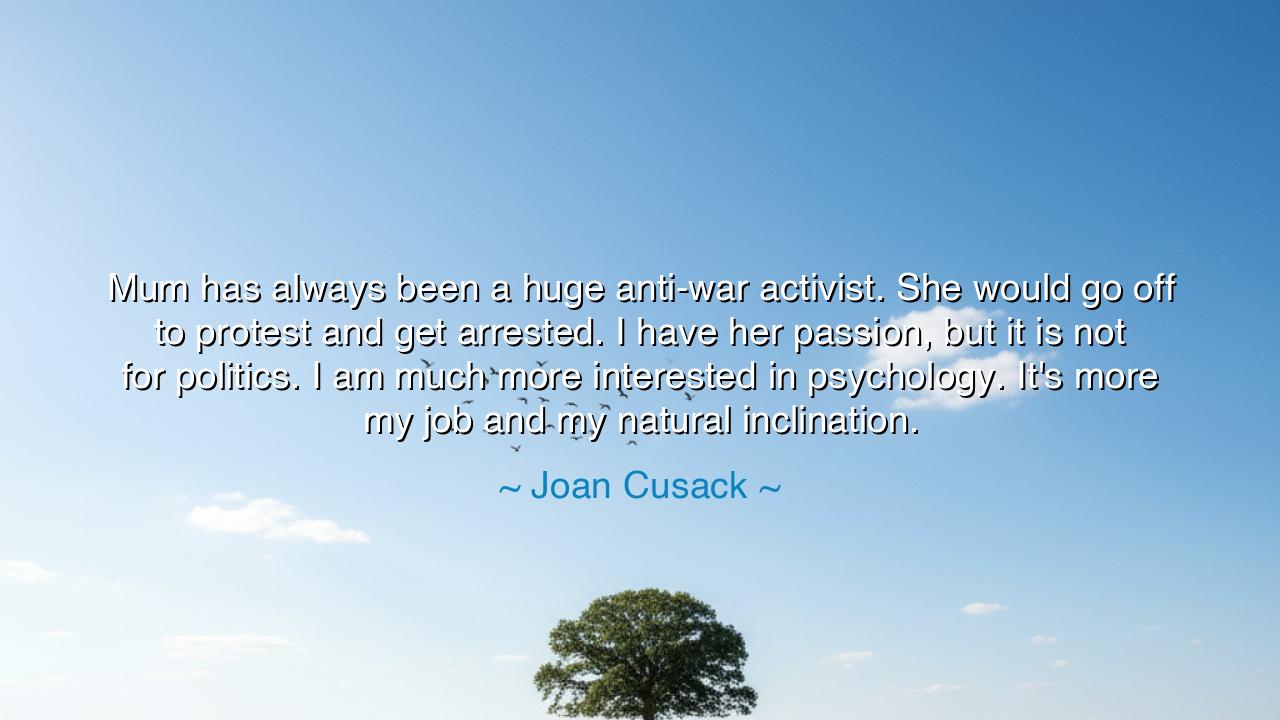
Mum has always been a huge anti-war activist. She would go off
Mum has always been a huge anti-war activist. She would go off to protest and get arrested. I have her passion, but it is not for politics. I am much more interested in psychology. It's more my job and my natural inclination.






Hear, O children of memory, the reflection of Joan Cusack, who spoke of the fire she inherited: “Mum has always been a huge anti-war activist. She would go off to protest and get arrested. I have her passion, but it is not for politics. I am much more interested in psychology. It's more my job and my natural inclination.” In this saying, we hear the tale of inheritance—not of identical footsteps, but of spirit passed from one generation to the next, transformed by calling and circumstance.
For her mother was a warrior of peace, raising her voice against the storms of war. She took to the streets, risked her freedom, and bore the iron of arrest, all in the name of humanity. This was the fire of activism, a passion rooted in justice and refusal to bow before violence. From such soil Joan was raised, and though she did not march upon the same road, she carried within her the same flame—reshaped, redirected, yet alive.
Joan declares that her devotion lies not in politics, but in psychology. Yet the two are not as distant as they may seem. Where her mother fought the machinery of war on the streets, Joan turns inward, tending the unseen struggles of the human soul. Both paths are born of compassion, both flow from the same source of empathy and defiance against cruelty. One seeks to heal nations, the other to heal hearts.
History bears many such reflections. Consider how Sophie Scholl, of the White Rose resistance in Nazi Germany, chose open defiance against tyranny, while Viktor Frankl, survivor of the camps, chose the path of psychology, writing Man’s Search for Meaning. Both fought darkness: one by protest, the other by revealing the power of the spirit. Joan’s inheritance is thus part of an ancient pattern—activism and healing as twin branches of the same tree.
Therefore, let this wisdom be preserved: passion is not bound to one form, nor to the same expression across generations. The essence of justice and compassion may flow through many channels—through protest, through teaching, through art, through science. Cusack’s words remind us that what matters is not that we mirror those before us, but that we honor their flame by letting it burn in the place where our own soul finds its truest work.






NTNguyen Tram
Joan’s differentiation between her mother’s activism and her own passion for psychology raises an important question about how we each find our own calling. What does it mean to be passionate about something that’s not directly political, yet still driven by a desire to make a difference? Is it possible that psychology, by understanding the mind, can help solve deeper societal issues that political activism alone cannot address?
BPBao Phan
Joan Cusack seems to be saying that while she shares her mother’s passion for change, she channels it differently. Is this a reflection of the complexity of human nature? That one might inherit certain inclinations from family but still forge their own path? What does this tell us about the importance of nurturing individuality, even when you are exposed to such strong activism from those close to you?
TPTu Pham
Joan Cusack’s point about her mother’s activism and her own interest in psychology is compelling. It makes me reflect on the ways people channel their passions—some choose the direct route of political activism, while others may choose fields that indirectly contribute to societal change, like psychology. Can we consider psychology as a form of activism, particularly when it comes to understanding and healing trauma caused by war and injustice?
Llevi
This quote makes me think about how we often inherit or witness passionate causes in our families, but it doesn’t always translate into our own life choices. Joan’s love for psychology seems to reflect a personal calling, while her mother’s activism reflects a different kind of passion. Is it possible to have an equally impactful life purpose that doesn’t involve politics or direct activism but still works to change the world in meaningful ways?
NDHieu Nguyen Duc
Joan Cusack’s statement brings up an interesting point about how passion and activism can manifest in different ways. It’s fascinating that her mother’s anti-war activism sparked such strong feelings, but Joan found her own path in psychology instead. Does this suggest that activism doesn’t always have to be political? Can passion for change manifest in non-political forms, like psychology, where understanding human behavior can ultimately impact societal change?